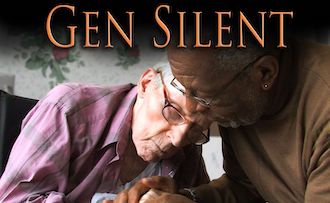
Gen Silent 2010
Distributed by The Clowder Group, 32TEN Studios, 3210 Kerner Blvd,San Rafael, CA 94901
Produced by Joseph Applebaum
Directed by Stu Maddux
Streaming, 70 mins
General Adult
Aging; Healthcare; Homosexuality
Date Entered: 07/26/2021
Reviewed by Karen Yacobucci, Head, Content Management & Library Outreach Strategist, NYU Langone HealthGen Silent is a 2010 documentary film which follows the lives of six LGBT (Lesbian, Gay, Bisexual, and Transgender) seniors living in the Boston area. Filmed over the course of one year, these six LGBT seniors are forced to decide whether or not to disclose their sexuality as they navigate the challenges associated with aging and receiving care through modern health care systems.
The film’s title is a reference to the generations of older LGBT individuals in America. In their youth, many of these individuals fought for equal rights and the ability to live freely and unhidden, now in the later and more vulnerable stages of their lives, they must decide to continue to live freely or hide their sexuality out of concerns for their personal safety.
The film discusses the issues of vulnerability that come with aging and isolation that many LGBT seniors are forced to content with, often without assistance from others. The film notes that 2/3rds of the senior LGBT community live alone and are more likely to be alone having not had children or being estranged from the families they once had.
Although the film follows some of the cast through their end-of-life, in many ways Gen Silent is a story of survival. Health disparities amongst the aging in LGBT communities are brought to the forefront, where awareness of the unique health challenges of senior LGBT individuals are lacking and often misunderstood. In order to find and sustain essential care, LGBT seniors are often forced to conceal their sexuality. The film notes that many, if not most, elder care facilities lack trained staff and policies that deter discrimination, stating that 50% of nursing home’s reported that their staff would be intolerant of LGBT patients.
Gen Silent shares the story of Lawrence Johnson and his long-time partner, Alexander. Afflicted with Parkinson’s Disease, Alexander requires constant care in an assisted living facility. Lawrence shares his concerns that Alexander could suffer from mistreatment and abuse based on his sexuality, and searches for months to find a facility where Alexander can receive quality healthcare while also not being forced to conceal his relationship with Lawrence. After finding a suitable home for Alexander, Lawrence is shown applying lotion to Alexander’s hands, remarking what a relief it is to be able to have such a small, yet intimate moment, without fear of retribution.
One of the greatest advocates for the aging LGBT community is the LGBT community themselves. In this documentary we also meet a transgender individual dying of terminal illness, living alone and estranged from their family, whose only source of support comes from a community of LGBT individuals and advocates they have only recently connected with. Members from the LGBT Aging Project are interviewed as one of the few non-profit organizations that work for LGBT health benefits and protections but acknowledge that there is still much work to be done and there is a great need for equal access services in the LGBT community.
Gen Silent is recommended for general viewing and is highly recommended for healthcare providers, educational providers in schools of medicine, and others who work in healthcare industries. Although released in 2010, the topic of LGBT health equity remains a current and persistent issue worth investigating. This film is a valuable resource for those who wish to increase their understanding of LGBT issues in healthcare.
Awards: 2010, Audience Award for Best Documentary, Sacramento Film & Music Festival; 2010, Jury Award for Best Documentary, Sacramento Film & Music Festival; 2011, Alternative Spirit Award, Rhode Island International Film Festival; 2011, Audience Choice for Best Documentary, Frameline Film Festival; 2011, Audience Award for Best Documentary, Connecticut Gay & Lesbian Film Festival; 2010, Audience Award for Best Documentary Charlotte Film Festival.
Published and licensed under the Creative Commons Attribution 4.0 license. Anyone can use these reviews, so long as they comply with the terms of the license.